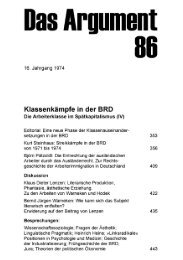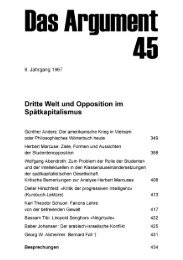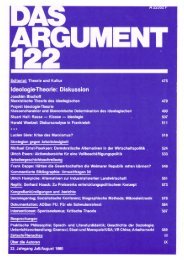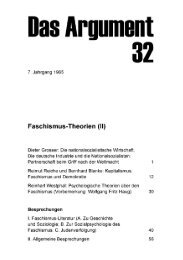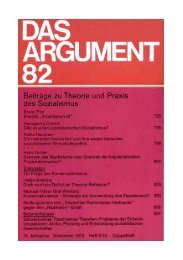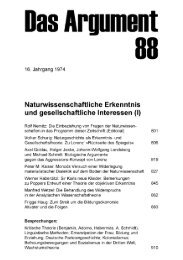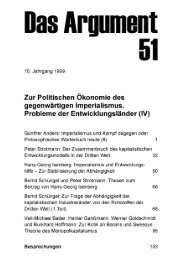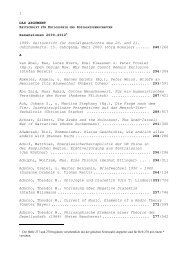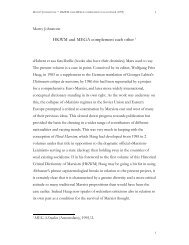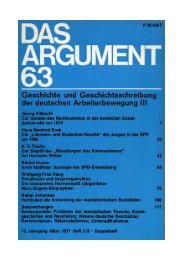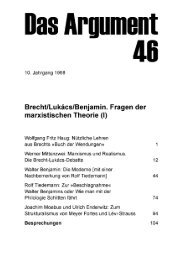Das Argument 91 - Berliner Institut für kritische Theorie eV
Das Argument 91 - Berliner Institut für kritische Theorie eV
Das Argument 91 - Berliner Institut für kritische Theorie eV
Sie wollen auch ein ePaper? Erhöhen Sie die Reichweite Ihrer Titel.
YUMPU macht aus Druck-PDFs automatisch weboptimierte ePaper, die Google liebt.
Persönlichkeitstheoretische Implikationen 439<br />
Literaturliste<br />
Ayllon und Azrin, N. H.: Intensive treatment of psychotic behavior by<br />
stimulus satiation and food reinforcement; in: Beh. Res. Ther., 1963, 1,<br />
S. 53—61.<br />
ders.: The measurement and reinforcement of behavior of psychotics; in:<br />
Journ. of the Exp. Analysis of Behavior, 1964, 8, S. 357—383.<br />
Breger und McGaugh, J. L.: Critique and reformulation of „learning<br />
theory" approaches to psychotherapy and neurosis; in: Psychol. Bull.,<br />
1965, 63, S. 338—358.<br />
ders.: Learning theory and behavior therapy: a reply to Rachman and<br />
Eysenck; in: Psychol. Bull. 1966, 65, S. 170—173.<br />
Buchwald, A. M. und Young, R. D.: Some comments on the foundations<br />
of behavior therapy; in: Franks, C. M. (ed.): Behavior Therapy: appraisal<br />
and status; New York 1969.<br />
Cattell, R. B.: Description and measurement of personality, New York<br />
1946.<br />
Costello, C. G.: Behavior Therapy: Criticisms and Confusions; in: Beh.<br />
Res. and Ther., 1963, 1, S. 159—161.<br />
Dollard, J. und Miller, N. E. : Personality and Psychotherapy — An analysis<br />
in terms of learning, thinking and culture; New York 1950.<br />
Drust, P. und Schürf, H.: „Psychische Störungen" aus marxistischer Sicht;<br />
in: Cramer, Gottwald (Hrsg.): Verhaltenstherapie in der Diskussion;<br />
München 1973.<br />
Eysenck, H. J.: Dimensions of personality; London 1947.<br />
Goldfried, M. R. und Kent, R. N.: Traditional vs. Behavioral Assessment —<br />
A comparison of methodological and theoretical assumptions; in:<br />
Psychol. Bull. 1972, 77, S. 409—420.<br />
Görres, A.: Methode und Erfahrungen der Psychoanalyse; München 1965.<br />
Goldstein, A. P.: Therapist — patient expectancies in psychotherapy; New<br />
York 1970.<br />
ders.: Psychotherapeutive attraction; New York 1970.<br />
Guilford, J. P.: Personality; New York 1959.<br />
Hartig, M.: Selbstkontrolle. Lerntheoretische und verhaltenstherapeutische<br />
Ansätze; München 1973.<br />
Holzkamp, K.: Kritische Psychologie; Frankfurt/M. 1970.<br />
Leontjew, A. N.: <strong>Das</strong> Problem der Tätigkeit in der Psychologie; in:<br />
Sowjetwissenschaft, Heft 4, 1973.<br />
ders.: Tätigkeit und Bewußtsein; in: Sowjetwissenschaft, Heft 5, 1973.<br />
London, P.: The End of Ideology in Behavior Modification; in: American<br />
Psychologist, 1972, 27, S. <strong>91</strong>3—920.<br />
Lovibond, S. H.: Personality and conditioning; in: Mahr, B. A. (ed.):<br />
Progress in experimental personality research; Vol. 1, New York 1964.<br />
Marks, I. M. und Gelder, M. G.: A Controlled retrospective study of<br />
behavior therapy in phobic patients; in: British Journ. Psychiatry,<br />
1965, 111, S. 561—573.<br />
Rattner, J.: Psychologische Menschenkenntnis; Zürich 1968.<br />
Skinner, B. F.: Waiden Two; New York 1948.<br />
ders.: Beyond Freedom and Dignity; New York 1971.<br />
Yates, A.: Behavior Therapy; New York 1970.<br />
DAS ARGUMENT <strong>91</strong>/1975 ©



